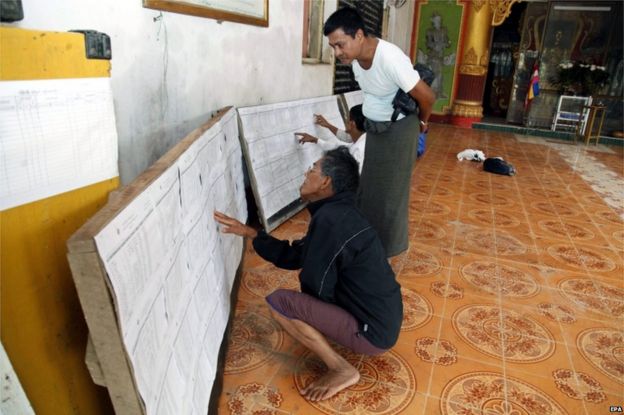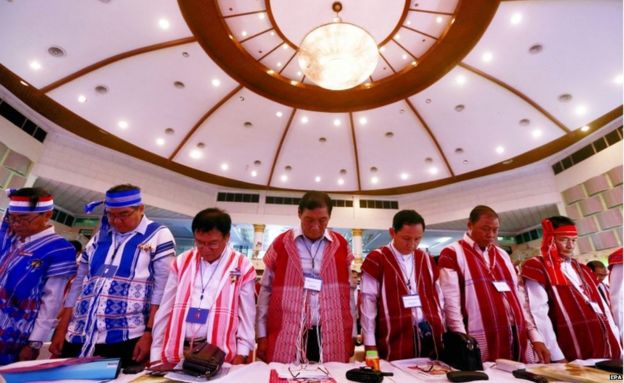Burmese politician Aung San Suu Kyi remains effectively barred from standing for president after Myanmar's general election in November, following a government review that left the constitution largely intact. Many view this as a major setback for her, but Myanmar expert Andrew McLeod argues that if anything, her odds may have improved.
Myanmar's impenetrable politics tempt the casual observer to read its transition from military rule as a sham.
The constitution grants the military automatic representation of at least 25% of parliamentary seats, guarantees a military veto over any constitutional change, and ensures only the military's commander-in-chief controls key ministry appointments.
It also excludes any person from becoming president if their family members are foreigners. By most accounts, this prohibition was designed to prevent Ms Suu Kyi, perhaps the most popular politician in the country, from ever becoming president - her two sons hold British citizenship.
Such broad brushstrokes, however, tend to mislead.
It is true that the progress made in the two-year constitutional review process that culminated in two parliamentary votes, the first in June and the second on Wednesday, is modest. There was only a minor change to the wording on presidential qualifications, and meagre new powers for state and regional parliaments.
But there has been a freer public debate than Myanmar, also known as Burma, has seen on this issue in two decades.
Until early 2013, it was technically a crime to critique the current constitution, and the mere mention of certain political ideals like federalism was treasonous.
In this sense, public debate about changing the constitution is a step forward by itself.

The two votes on constitutional change are better understood as political theatre, engineered by the pragmatic presidential candidate and current Speaker, Thura Shwe Mann, quite possibly with Ms Suu Kyi's knowledge and consent.
The military has consistently made clear that it is not in favour of constitutional change and both Ms Suu Kyi and Mr Shwe Mann know this.
In allowing the two constitutional amendment bills to come to a vote, Mr Shwe Mann and Ms Suu Kyi have forced military lawmakers to make their position public and unequivocal in the same week that the date of the general election was announced.
For Mr Shwe Mann, this creates distance between him and the military regime of which he was a leader until 2011.
For Ms Suu Kyi, it simplifies her message to the electorate: "The military is holding up reforms - a vote for me is a vote for change".
Myanmar's president is not popularly elected, with an electoral college formed from national parliamentarians voting to choose the president and two vice-presidents.
If Ms Suu Kyi and her party, the National League for Democracy (NLD), secure the electoral success expected in November's polls, the pressure on the military to alter the constitution and allow her to become president will be high.
Room for manoeuvre?
Several mechanisms exist for this to occur before the next parliament convenes in late January 2016.
The parliament as currently constituted will likely sit in lame duck sessions following the elections, during December and January.
Changing the presidential qualifications is a two-step process. It must be approved by parliament and then by the public in a referendum.
If the NLD wins in November, it could immediately table its own amendment bill and demand a referendum from the election commission, before the new parliament selects a new president. Ms Suu Kyi would be banking on the military changing its stance to avoid public unrest.
Alternatively, Ms Suu Kyi might negotiate an informal arrangement among representatives of the next parliament and the military's leadership.
Such an agreement could enable the appointment of a caretaker president while constitutional changes are implemented, who would later step aside to clear the way for Ms Suu Kyi's selection.

Significant hurdles still lie in the way of Ms Suu Kyi securing a comprehensive electoral victory.
A nationalistic Buddhist monk movement has waged an 18-month campaign to undermine NLD's support among Buddhists, who represent close to two-thirds of Myanmar's population.
A panoply of ethnic parties threaten Ms Suu Kyi's electoral hopes in the rest of the country occupied by minority ethnic groups.
And the risk of voter intimidation, electoral maladministration or fraud constantly lies in the background of the upcoming vote.
Even if these issues are overcome, danger still lurks in the unfulfilled constitutional ambitions of Myanmar's minorities.
This week's amendments granted new legislative and revenue-raising powers to sub-national governments, but their administration and appointment of chief ministers isstill under the central government's control.
The changes enacted will have little real impact on the autonomy of local governments in ethnic-dominated areas. Ethnic leaders, some informally affiliated with armed groups at war with Myanmar's military, have already dismissed the ability of existing processes to address their constitutional demands.
The possibility of Myanmar slipping back into all-out civil war always lies in the background. This will surely remain on the military's mind as it considers the risks of allowing further constitutional change.
Andrew McLeod is a Research Fellow in Law at the University of Oxford and directs the Oxford Burma/Myanmar Law Programme. For the past two years, he has advised the parliamentary committees reviewing Myanmar's constitution.

No comments:
Post a Comment